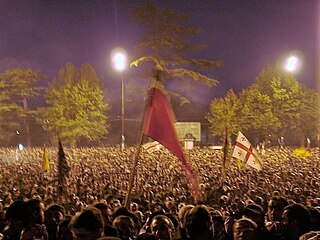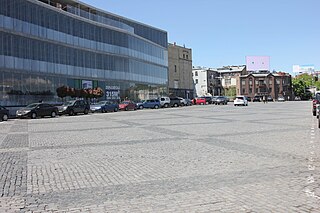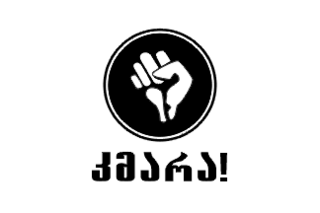 W
WThe Revolution of Roses, often translated into English as the Rose Revolution, was a pro-Western peaceful change of power in Georgia in November 2003. The revolution was brought about by widespread protests over the disputed parliamentary elections and culminated in the ousting of President Eduard Shevardnadze, which marked the end of the Soviet era of leadership in the country. The event derives its name from the climactic moment, when demonstrators led by Mikheil Saakashvili stormed the Parliament session with red roses in hand.
 W
WParliamentary elections were held in Georgia on 2 November 2003 alongside a constitutional referendum. According to statistics released by the Georgian Election Commission, the elections were won by a combination of parties supporting President Eduard Shevardnadze.
 W
WLegislative elections were held in the Georgia on 28 March 2004. The elections followed the annulment of the November 2003 legislative elections, which were widely believed to have been rigged by the former President, Eduard Shevardnadze. New elections were ordered following the resignation of Shevardnadze and the election of President Mikhail Saakashvili in January 2004.
 W
WAslan Abashidze is the former leader of the Ajarian Autonomous Republic in western Georgia. He served in this capacity from 18 August 1991 to May 5, 2004. He resigned under the pressure of the central Georgian government and mass opposition rallies during the 2004 Adjara crisis, and has since lived in Moscow, Russia. On January 22, 2007, the Batumi city court found him guilty of misuse of office and embezzlement of GEL 98.2 million in state funds, and sentenced him to 15 years' imprisonment in absentia. He also faces a charge of murder of his former deputy, Nodar Imnadze, in 1991.
 W
WNino Burjanadze is a Georgian politician and lawyer who served as Chairperson of the Parliament of Georgia from November 2001 to June 2008. As the first woman she has served as the acting head of state of Georgia twice; the first time from 23 November 2003 to 25 January 2004 in the wake of Eduard Shevardnadze's resignation during the Rose Revolution, and again from 25 November 2007 to 20 January 2008, when Mikheil Saakashvili stepped down to rerun in the early presidential elections. She withdrew into opposition to Saakashvili as the leader of the Democratic Movement-United Georgia party in 2008. In October 2013, she ran for president in the October 2013 election. She ran against 22 candidates and ended third with 10 percent of the vote.
 W
WFirst Republic Square former Rose Revolution Square is a square in the Vera district of Tbilisi at the western end of Rustaveli Ave. The square was constructed in 1983 and named Republic Square. In 2005 it was renamed into Rose Revolution Square after the Rose Revolution.
 W
WA presidential election was held in the Republic of Georgia on January 4, 2004. The election followed the resignation of former President Eduard Shevardnadze. As expected, the main opposition leader, Mikhail Saakashvili, was soon shown by exit polls to be heading for an overwhelming victory. According to preliminary results issued on January 6 by Georgia's Central Election Commission, Saakashvili won over 97% of the votes cast.
 W
WKmara was a civic youth resistance movement in Georgia, active in the protests prior to and during the November 2003 Rose Revolution, which toppled down the government of Eduard Shevardnadze. Consciously modeled on the Serbian nongovernmental organization (NGO) Otpor!, which had been instrumental in defeating Slobodan Milošević's regime in 2000, the Kmara members were trained and advised by the influential Georgian NGO Liberty Institute and funded by the United States-based Open Society Institute (OSI). The movement was a hybrid of social movement and virtual NGO, which was highly successful in mobilizing the young Georgians, mostly students, against Shevardnadze's rule. Although Kmara was allied with the opposition parties, especially Mikheil Saakashvili's United National Movement, its behavior and tactics were nonpartisan, focusing on criticizing corruption and failures of the Shevardnadze regime, rather than promoting any particular politician or political party.
 W
WMikheil Saakashvili is a Georgian and Ukrainian politician. He was the third President of Georgia for two consecutive terms from 25 January 2004 to 17 November 2013. From May 2015 until November 2016, Saakashvili was the Governor of Ukraine's Odessa Oblast. He is the founder and former chairman of the United National Movement party. Saakashvili heads Ukraine's National Reform Council since 7 May 2020.
 W
WEduard Ambrosiyevich Shevardnadze was a Georgian politician and diplomat. He served as First Secretary of the Georgian Communist Party (GPC), the de facto leader of Soviet Georgia from 1972 to 1985 and as Minister of Foreign Affairs of the Soviet Union from 1985 to 1991. Shevardnadze was responsible for many key decisions in Soviet foreign policy during the Gorbachev Era including reunification of Germany. Following the dissolution of the Soviet Union, he was President of Georgia from 1992 to 2003. He was forced to retire in 2003 as a consequence of the bloodless Rose Revolution.
 W
WThe Union of Citizens of Georgia was a centre-left political party established by Eduard Shevardnadze, President of Georgian SSR from 1972-1985 and then Georgia from 1992–2003 and David Chantladze, former General Trade Representative of the Soviet Union to Czechoslovakia. It was established in the mid-1990s as a vehicle for modernising politicians. It became the majority grouping in the Georgian parliament following the parliamentary elections of November 1995, with Shevardnadze winning the presidency at the same time.
 W
WUnited National Movement is a political party in Georgia.